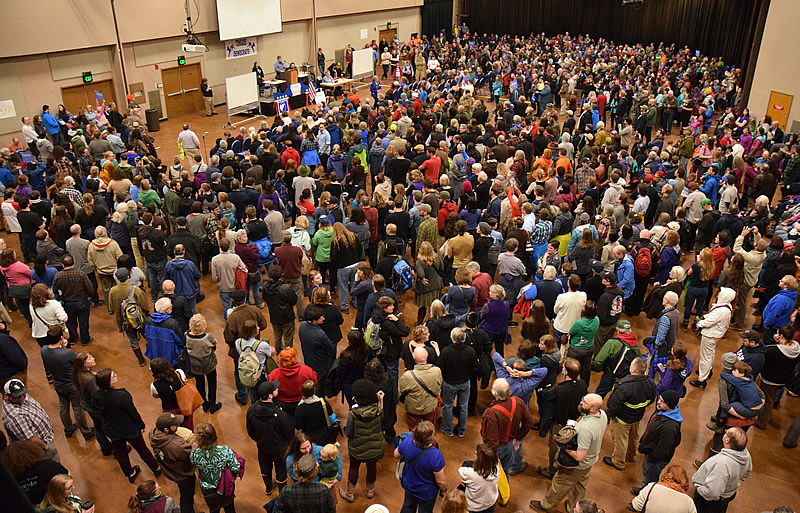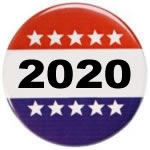
By Andy Brack, editor and publisher | South Carolina will again play an outsized role in picking the next presidential candidates for U.S. voters. It’s where the political rubber hits the road.
 In large part, the story is told by the numbers:
In large part, the story is told by the numbers:
Iowa, which holds the first presidential contest every four years, is home to 3.1 million people, 91 percent of whom are white. But its battle, set for Feb. 3, is a caucus of delegates, who are party stalwarts. Participation isn’t ubiquitous.
New Hampshire, which holds the first primary on Feb. 11, is home to 1.3 million people, 94 percent of whom are white. It isn’t a reflection of most of America.
Nevada, an early voting state since 2008, also uses caucuses for its population of 2.8 million, 68 percent of whom are white and 28 percent of whom are of Latino descent. Its caucuses are set for Feb. 22.
South Carolina offers primary elections in which any voter can participate, since voters don’t register by party. It has a population of 5.1 million people, 69 percent of whom are white residents, 27 percent are black and 5.7 percent are of Hispanic background.
Chip Felkel, a moderate Greenville Republican who provides frequent political insight to Canadian television audiences, observed that diversity in South Carolina’s electorate included having a lot of transplants – people who retired here after a business or military career.
“We’re a much better test of different groups and how candidates can appear to different groups,” he said. “We have those groups here. We’re not homogenous like Iowa or New Hampshire.”
 Bottom line: South Carolina is the most important of the four states because it offers all registered voters a chance to participate and its demographics are more diverse than Iowa and New Hampshire. And for candidates, South Carolina is a place where candidates get the best test of their messages.
Bottom line: South Carolina is the most important of the four states because it offers all registered voters a chance to participate and its demographics are more diverse than Iowa and New Hampshire. And for candidates, South Carolina is a place where candidates get the best test of their messages.
“For Dems, we are the first test of African American support, which is hyper-critical for any would-be nominee,” said Winthrop University pollster Scott Huffmon. “For the GOP, we are the first test of the broad swaths of conservatism. We have large contingents of everything from evangelicals to libertarian-leaning, small-government folks to business Republicans needed to secure the nomination and possibly the White House.”
College of Charleston professor Gibbs Knotts, who plans on publishing a book about South Carolina’s critical role in the presidential process later this year with colleague Jordan Ragusa, agreed with Huffmon’s observation about the importance of South Carolina’s diversity in the Democratic primary.
![]() “The Republican primary is important because the electorate is very representative of the national Republican electorate,” he added. “We argue that this ‘representativeness’ is the reason that S.C. Republicans have correctly selected the GOP winner in all contests but 2012.”
“The Republican primary is important because the electorate is very representative of the national Republican electorate,” he added. “We argue that this ‘representativeness’ is the reason that S.C. Republicans have correctly selected the GOP winner in all contests but 2012.”
Noted Charleston chef and author Nathalie Dupree, who holds frequent dinner parties where talk often turns to politics, added, “We are important to the Republicans as we are conservative and they can gauge the rest of the country by our response.”
There have been news reports that the S.C. GOP, which continues to tout its First in the South primary online, may not have a 2020 primary. But inquiries to the party for an update went unanswered.
Meanwhile, South Carolina Democrats are preparing for an onslaught of candidates coming to the state in the next year.
![]() “The state’s Democrats have thinned out the field before Super Tuesdays in recent primaries, lifting Barack Obama in 2008 and Hillary Clinton in 2016,” Columbia public relations consultant Bud Ferillo observed. Super Tuesday in 2020 is March 3, three days after the S.C. primary.
“The state’s Democrats have thinned out the field before Super Tuesdays in recent primaries, lifting Barack Obama in 2008 and Hillary Clinton in 2016,” Columbia public relations consultant Bud Ferillo observed. Super Tuesday in 2020 is March 3, three days after the S.C. primary.
Furman University political scientist Danielle Vinson observed that the South Carolina Democratic Party’s presidential primary will test progressives more than moderates because the state is generally more moderate.
“Although we typically don’t see Southern states as particularly important to Democrats when the general election comes around, I think the close races we saw in Georgia and North Carolina put some of the Southern states in play — but only if Democrats figure out how to talk to moderates.
“South Carolina gives them an opportunity to practice. And as they should have learned from 2016, they can’t take any state for granted.”
- Have a comment? Send to: feedback@statehousereport.com.


